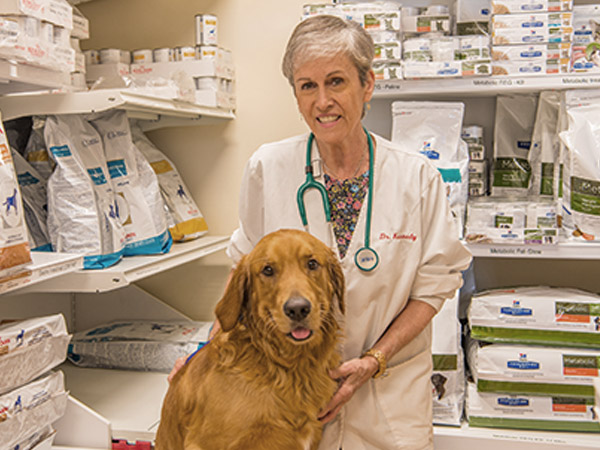Preventive Care
Vaccinations: Many Veterinarians only see pets for puppy/ kitten exams and legally mandated immunizations. What many pet owners fail to realize is that modern veterinary science has provided tools that enable veterinarians to diagnose and treat a whole range of conditions that were previously considered to be simply declining health due to old age, with euthanasia being the only humane solution.
Comprehensive Exams
A physical exam is one of the best tools available to keep your pet healthy. With regular veterinary checkups (we recommend semi-annual) and early treatment, yesterday’s old age for a pet is now the new pet middle age, with more years of good health and activity ahead for your pet to spend together you.
Vaccinations
If your pet is due for “shots”, they can be administered during these twice-yearly examinations. We use only the highest quality vaccines that are intended to be “non-reactive” and not cause anaphylaxis (allergic reaction). However, we still prefer not to give more than one vaccine at a visit if possible. Our current protocol after the puppy/kitten series is to give annual DHPP for dogs, FVRCP for cats, and alternate the Rabies and Bordetella or other elective vaccines. We follow a three-year vaccination protocol starting at 4 years of age, since we do not believe in overvaccination. We will complete a lifestyle disease risk assessment form prior to administering any vaccinations to ensure that we are creating a specific vaccine plan customized to the needs of you and your pet. We are certain that you will find twice-yearly veterinary wellness exams for your pet to be a good investment in terms of money saved over the long run and, more importantly, in the longer and healthier life your pet can enjoy with you.
Blood Tests
We recommend semi-annual blood tests and urinalysis for ALL ages of pets. Preventative medicine means finding disease BEFORE it becomes a serious problem for your pet. Considering that one human year is equal to approximately 7 years for a pet, semi annual blood wellness profiles are always recommended.
Benefits of Preventive Care
- Preventing disease
- Identifying problems and diseases in the early stages
- Providing the quality of life you wish to give your pet
Diagnostic Testing
Diagnostic testing can show evidence of disease or simply provide a baseline for future reference. Our in-hospital lab is equipped to give us fast and accurate results, allowing your veterinarian to address your pet’s health condition in a timely manner. Diagnostic testing may also serve as a pre-anesthetic screen prior to a surgical procedure requiring general anesthesia.
Routine Spay & Neuter Surgery
Pet-population control is important, and altering your pet to prevent unwanted litters of puppies and kittens is strongly advised. However, there are other reasons to spay and neuter your pet. Spaying females helps to prevent mammary and uterine infections and cancers. Neutering males helps to prevent prostate and testicular cancers. Altering your pet may also control some of the hormonal urges that can lead to undesirable behaviors.
Dentistry
Dental care is one of the most effective ways to prolong your pet’s life and prevent the chronic discomfort that accompanies dental disease. For humans, caring for our teeth and gums is part of our daily routine. Without care serious problems with our teeth and gums would develop. Your pet needs dental care to prevent problems too. Those pets that receive routine dental care have fewer heart, lung, kidney, and liver problems as they mature, as well as nicer breath!
Microchipping
We recommend microchipping your pets to ensure recovery if they get lost.
In the event of an accidental separation, identification tags on your pet’s collar are very important and are the quickest way to get him home. For example, if someone who lives two blocks away finds your pet and he is wearing a collar with ID tags, that person is likely to call you directly. If for some reason your pet does not have tags or if he detached his collar in the escape, the microchip is the next level of protection.
Microchips are tiny transmitters (about the size of a grain of rice) that are implanted just under the skin, between the shoulder blades. They are implanted by injection, very similar to vaccine administration. Your pet does not need to be anesthetized to have a microchip placed. Once placed, the microchip does not cause any pain or discomfort.
Microchips are made of an inert, biocompatible substance. It will not cause an allergic reaction, will not degrade over time, and is designed not to migrate through the tissues. The microchip does not have any internal power source and is inactive most of the time. When a scanner is passed over the pet’s shoulders, the microchip gets enough power from the scanner to transmit your pet’s personal identification number to the scanner. Virtually all veterinary hospitals and animal shelters have scanners. The scanner displays your pet’s identification number, the veterinary hospital or animal shelter contacts the registry to get your name and telephone number, and they contact you to let you know they have your dog or cat.
We use the microchip company called “HomeAgain” but the scanners are universal and will read any brand of microchip. If you lose your pet and contact the HomeAgain company, they will also help you by alerting veterinarians and shelters in the surrounding area in which your pet was lost.
The biggest downside of a microchip is that it can’t work if you do not register your microchipped pet with the registry. In addition, there have been extremely rare reports of migration of microchips and irritation or tumor development at the site of the microchip. We have not seen any of our patients have any reactions or problems associated with microchips.

